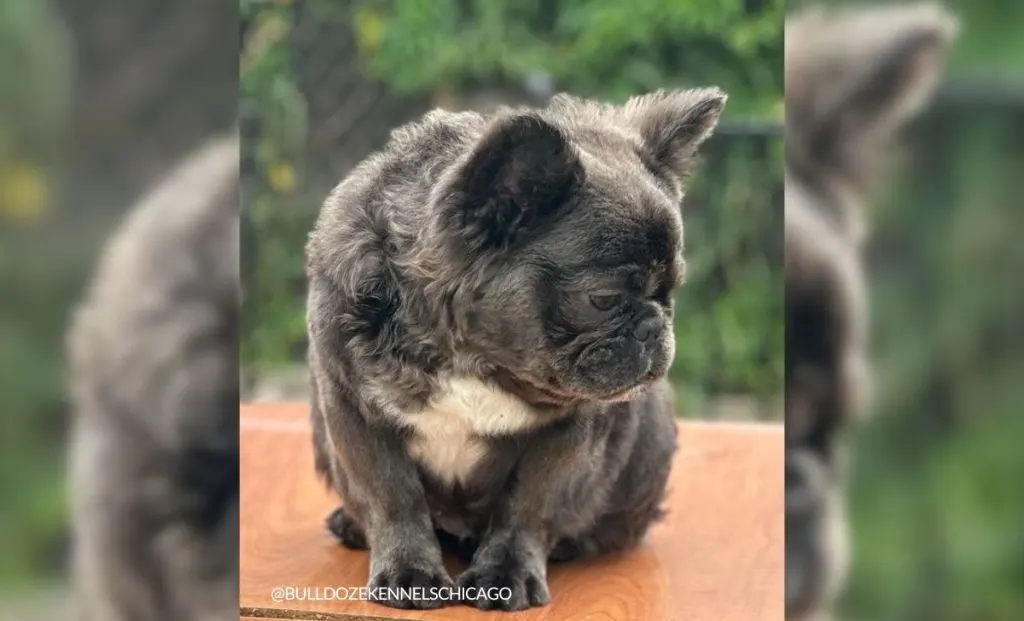Hey there, fellow dog lovers! Are you here because you’re interested in Mini French Bulldogs? Hop right in because we’re about to go on a ride!
For many of us living in urban areas, the smaller the better is the general rule when choosing a puppy of our choice. Small dogs are easier to fit in a tiny apartment, they are easier to manage and are typically more suitable for inexperienced owners.
Not to mention just how cute these doggies are!
Unfortunately, many small dogs are the result of bad breeding practices, resulting in sickly pups that will cost dozens in vet bills.
Is this the case with Mini French Bulldogs? And are they really as small as people say? And what’s the difference between standard Mini Frenchies and other teacup-size varieties?
Let’s find out!
Mini French Bulldog Quick Overview
| Height | Up to 11 inches |
| Weight | 8 – 14 pounds |
| Temperament | Playful, social, gentle, affectionate |
| Trainability | High |
| Exercise Needs | Low |
| Grooming Needs | Low to moderate |
| Lifespan | 10 – 14 years |
What Is The Mini Frenchie?

Mini French Bulldog is the miniature version of a small Frenchie everybody knows. These pups were intentionally bred for their small stature, making them even more suitable to be perfect family companions for small apartments.
Breeders have numerous methods for creating Mini French Bulldogs. This includes crossbreeding with smaller dog breeds, such as Yorkshire Terriers or Chihuahuas. Yes, your Mini Frenchie might be a Chihuahua mix!
Another option is to breed Frenchies that just happened to be of a smaller size. This includes runts of the litter, or pups with dwarfism.
Each of these methods has its pros and cons, and Frenchies created from these practices can have some differences between themselves due to different genetics.
Micro Mini Vs Teacup French Bulldog
If you’ve just started looking into Miniature Frenchies, you might’ve heard about several names, such as Micro French Bulldogs or Teacup French Bulldogs. This might make you think there are various size variations of this breed.
However, all of these adjectives essentially describe the same dog. Standard Frenchies are pretty small as is, so there really isn’t a need to create numerous small varieties. There is only one Mini Frenchie, no matter what you call it.
So, whether you’ve heard about teacup or micro dogs when it comes to French Bulldogs, they all simply mean that you’re looking at a smaller dog than usual.
Breed History

It isn’t really clear when the first Mini French Bulldog was bred. Chances are it was created by accident, and people have simply realized their pups come in a smaller size.
French Bulldogs were developed in Paris in the mid-nineteenth century, and it is believed they are the product of crossbreeding Rat Terriers with English Toy Bulldogs. They were already bred to be a small dog breed, and for years no one attempted to make them smaller.
However, with urbanization, people realized that smaller is the better, and they wanted to create adult dogs that remain the size of puppies.
Producing Miniature French Bulldogs has only become popular in the 21st century, but the truth is that dogs smaller than the norm were bred for decades, either intentionally or by accident.
Either way, this rare breed of dog is now one of the most sought-after small Bulldog pups.
Appearance
Mini French Bulldogs should look just like standard Frenchies. This includes a small stature, short legs, and tiny, floppy ears.
Let’s not forget about their brachycephalic faces, one of their most significant physical traits.
They have short coats that can come in numerous colors, including some rare varieties such as brindle, lilac, and Merle French Bulldogs. Many have white markings, but other patterns are also acceptable.
One thing’s important to understand: Miniature French Bulldogs are not an official breed accepted by the American Kennel Club (AKC). This means that their breeding is not regulated and that breeders are not required to make sure their physical characteristics are up to the breed standard.
In other words, you may find a Mini French Bulldog with certain traits that might set them apart from standard Frenchies.
Size Expectations
Of course, the main trait you’re all here for is just how big do French Bulldog puppies grow to be.
While standard, purebred French Bulldogs tend to reach the size of up to 21 inches and a weight of up to 28 pounds, their miniature varieties, as their name suggests, should be smaller than that.
However, as I’ve already mentioned, considering there’s no breed standard, it’s challenging to say what the right size for a Miniature French Bulldog is. In general, as long as they are shorter than their purebred cousins, they will be considered miniature.
Most breeders will sell Miniature French Bulldogs that are no taller than 11 inches, weighing between 8 and 14 pounds.
Temperament

Considering how many Mini Frenchies are actually mixed breed, many prospective owners are wondering about how different their temperaments are to their purebred cousins.
In general, though, their personalities should be as similar to standard Frenchies as possible. They are a wonderful family breed that makes excellent companions to almost everyone.
They are friendly and affectionate while also being gentle towards everyone. This makes them a good companion for family life—as long as you’re careful not to leave them around young children who don’t know how to behave around dogs.
Due to their small bodies, little kids might mistake them for toys and hurt them by accident. This can not only result in injuries (or worse) to your pup but also traumatize your children.
Frenchies are a loveable breed of Bulldogs that are also very playful. Sure, they might not have a lot of energy, but they’ll spend every last ounce of it to jump around and entertain you – especially if this might give them more of your attention.
Speaking of attention, these small dogs will want a lot of it. They’ll insist you spend every breathing moment cuddling with them. In fact, they love their humans so much that they are prone to separation anxiety, so make sure not to leave them alone for too long.
This also means they are a perfect fit for large families, as there will always be someone to play with them and shower them with love.
Finally, they are quite loud. I’m not only talking about barking, although this is something they’ll do a lot. They also snore, whine, wheeze, and produce all sorts of sounds you can imagine.
Luckily for them, this only further adds to their cuteness.
Caring For A Mini Frenchie

If you’re considering owning a French Bulldog, you’re probably wondering whether these pups are challenging to care for.
There is a general misconception that small breeds are easy to care for. They are fine in small spaces, rarely get into serious trouble, and are a great choice for family life.
Not to mention how many pet owners think small dogs are hypoallergenic, and they won’t cause any trouble for most people with breathing issues!
The truth is, though, that French Bulldogs do require some specific care. As an overall breed, they are very sensitive, and you might end up spending a better part of the week caring for them.
I want to make it clear that this isn’t a bad thing. All living beings need care to survive and to live long and fulfilling lives. However, I just wish to emphasize that you cannot get a Mini French Bulldog and then not spend any care on them.
Here’s what it takes to care for a Mini French Bulldog:
Feeding
Feeding is probably the first thing that comes to mind when it comes to caring for a pet.
Due to their small size, Mini French Bulldogs don’t require a lot of food. They need up to 500 calories per day, separated into two to three meals. Of course, puppies and senior dogs might need slightly different feeding schedules.
However, they have sensitive stomachs and are prone to gastrointestinal issues. You need to choose their food carefully.
I would advise you to stay away from feeding raw (unless instructed by the professional), and instead stick to high-quality commercial dog food made especially for small breeds.
Try looking for hypoallergenic foods advertised for pups with sensitive stomachs. They usually contain a single protein source and don’t contain any ingredients that can cause tummy upset.
Ingredients such as omega-3 fatty acids, vitamins, zinc, and phosphorus are not only good for your puppy’s stomach but also for its appearance. Good fats and minerals can improve skin and coat health – which is quite important as Frenchies tend to have sensitive skin.
While there is nothing wrong with kibble, try giving him wet food at least every now and then. Also, make sure he always has fresh water available.
Finally, treats are fine, but they shouldn’t take up more than 10% of your pup’s daily calorie intake. Miniature French Bulldogs are prone to obesity, and you don’t want to contribute to them.
Grooming

Mini French Bulldogs are fairly easy to groom, at least when it comes to coat care. They have short hair that only requires occasional brushing and combing.
They are shedding moderately, so they are not a good choice for people who struggle with dog allergies. Not only that, but they also drool, which is another allergen that might trigger breathing issues.
If you’re looking for a hypoallergenic breed, maybe one of these Poodle mixes might be a better choice.
However, you need to pay close attention to their ear and wrinkle care. They are prone to skin and ear infections, and both can be prevented with proper hygiene.
As they love to roll in poop and other smelly stuff, you might need to bathe them quite often. Still, don’t go overboard, as this can further irritate their skin. Unless they’ve gotten themselves dirty, it’s enough to give them a bath every two to three months.
Make sure to add teeth brushing and nail trimming to your dog’s regular grooming routine.
Training
Calmness and loyalty are some of the best Frenchie traits every owner appreciates. However, don’t let this fool you into thinking these pups don’t need to learn how to be obedient. Even a teacup French Bulldog needs regular training!
Luckily, training a French Bulldog puppy is quite an easy task. These pups are obedient and love to make their owners happy.
However, they might have some trouble focusing, so try to make training sessions as entertaining as possible.
They are very food-driven, so positive reinforcement works wonders in helping them learn how to behave. Just remember that treats given during training still have calories!
As Frenchies are intelligent dogs, they also need plenty of mental stimulation. If they get bored, they might become mischievous or even destructive. Not to mention how this might worsen their separation anxiety.
Lastly, no matter how friendly a dog is, some socialization is still necessary. Make sure they experience as many new things as possible from the earliest puppyhood, so these sensitive pups can be as prepared for the outside world as possible.
Exercise Needs
French Bulldogs of all sizes don’t have high exercise needs. Quite the opposite – they are known for being true couch potatoes.
However, this doesn’t mean they should lie in their beds all day long. They still need daily walks and a quick game of fetch.
Just remember not to go overboard. They are prone to joint conditions such as elbow and hip dysplasia, and this can worsen if they overexercise. The same goes for exercising too little. Balance is crucial to making sure they are in good health.
Health Problems

Unfortunately, Mini French Bulldogs come with a host of health problems, many of which are due to their small size.
While French Bulldogs are sensitive but overall a healthy breed, the same cannot be said for their smaller cousins.
As many of them are the results of breeding runts, which are known for their poor health, they can have plenty of genetic diseases.
Even pups who are mutts are likely the result of unreported breeding, which means the breeder probably never conducted health tests to make sure the offspring is healthy.
As a result, they are prone to conditions such as:
- Hip and elbow dysplasia
- Patellar luxation
- Eye problems, such as conjunctivitis, cataracts, and corneal ulcer
- Degenerative disc disease
- Spinal disease
- Stomach issues, such as chronic diarrhea
- Brachycephalic airway syndrome
- Cardiovascular disease
- Skin fold dermatitis
- Cleft palate
- Cancer
This is why it’s important to always buy from a reputable breeder with years of breeding experience. Such a professional will make sure the French Bulldog puppies they breed are as healthy as possible, and they’ll be open about potential health issues.
Keep a close eye on your dog, and if you suspect he requires vet care, don’t hesitate.
Life Expectancy
Predicting the lifespan of Mini French Bulldogs is nearly impossible, as many factors affect life expectancy.
However, most miniature Frenchies are expected to live between 10 and 14 years, which is quite a decent lifespan.
With proper care and regular vet visits, your pup might live even longer.
Cost
Many things can affect the cost of a mini French Bulldog. Also, as they are not a regulated breed, these costs can vary greatly depending on the person or organization you’re buying from.
It’s important to look for a reputable breeder in the United States who takes great care in making sure their pups are as healthy as possible.
Sure, their prices might be higher, but there’s a catch: If you pay a small price for your pup, you might end up paying a lot in veterinary bills.
On average, standard French Bulldogs cost between $1,500 to $3,000. However, their miniature varieties will usually cost more – sometimes even up to $5,000. This is especially the case for dogs advertised as teacup French Bulldogs, as their prices tend to skyrocket.
Is Breeding Mini French Bulldogs Ethical?

There is an ongoing debate about whether breeding Mini French Bulldog puppies is ethical or not. Unfortunately, it’s hard to be a judge in such cases.
Many experts consider any intentional shrinking of breeds to be cruel. These dogs are often the result of breeding sickly dogs, which means risking harmful health conditions that will worsen a pup’s quality of life.
However, this is something that will always happen. Owners want small dogs they can keep in small apartments without them feeling crowded.
If there are no reputable breeders who will breed teacup dogs, the market will be overflood with backyard breeders and puppy mills who consider dogs a way to earn quick money.
Still, the question is which is the most ethical way to produce Mini French Bulldogs. Crossbreeding with smaller breeds, such as Chihuahuas or Rat Terriers, seems like a better option, as it results in healthy offspring.
Unfortunately, dogs produced in such a way might lose some traits their parents are known for, and some owners might not want that.
Whether you support teacup breeds or not, understanding the effort reputable breeders make is crucial for bettering any dog breed out there, regardless of its size.
Should You Get A Mini Frenchie?
So, after reading all this, do you think Mini Frenchies are a good pick for you?
Mini French Bulldogs are an excellent choice for people living in small apartments looking for a loyal family companion that will stay by their side all day long.
However, they are not toys, so you should be mindful if you’re having small kids about keeping both sides as safe as possible. Also, they are not a good fit for people who work an 8-hour shift in the office due to separation anxiety.
Let’s not mention the plethora of health conditions these pups might have, all of which will probably end up costing a lot.
Finally, there is a question of whether it is ethical to support the breeding of teacup breeds, but this is something everyone seems to have their own opinion on.
In the end, it is up to you to decide whether this is the right pet for you. One thing is certain: These are some of the cutest and friendliest pups you can find!

Vanja’s passion for writing started at an early age, which is why she pursued Journalism as her college degree. She can research any topic and find all the information before you bat an eye, which is a great thing for her job but a terrible one for her husband.
Even as a young child, she fell in love with everything fluffy – but dogs have a special place in her heart due to her childhood companion, a Corgie named Archie.
Motivated by her experiences and driven by a desire to give back to her four-legged companions, she spends her free time volunteering at a local dog shelter.
